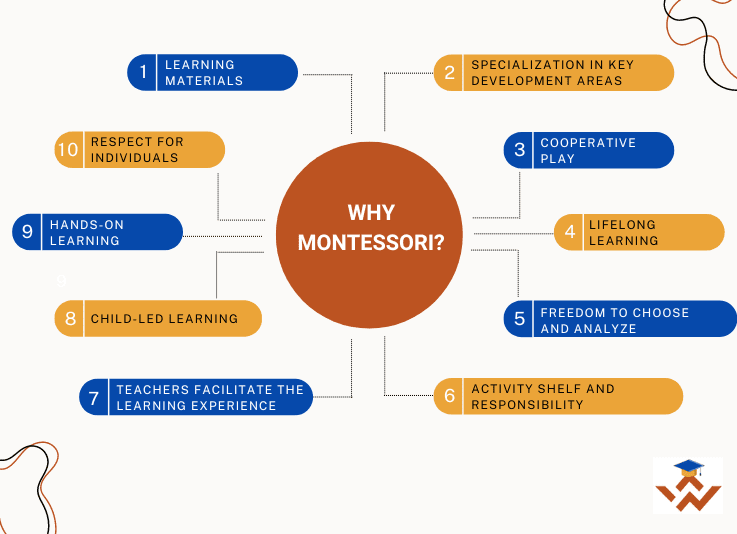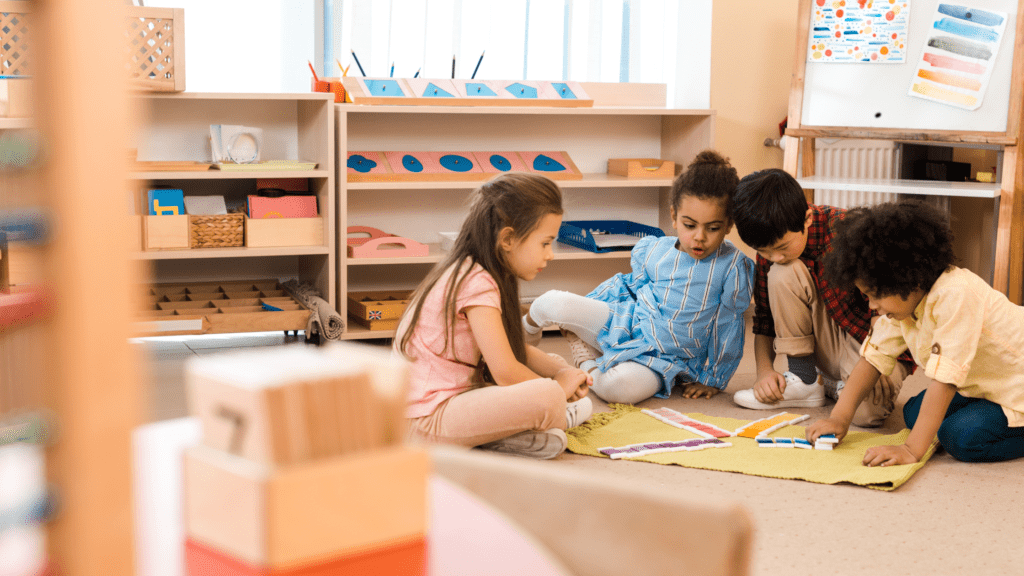All parents aspire to provide the best educational program for their children, but have you ever thought about how your child learns—by choice or compulsion?
Opting for the right educational method for the child is a significant decision. It greatly influences the formative years of the child.
A recent research by Mira Debs and published online by Cambridge University Press states that as the Indian government started to emphasise early childhood education, learner-centred education, and hands-on learning, Montessori education stands poised to contribute and are willing to orient their efforts toward child-centred, developmentally appropriate, and academically oriented education
As an expert in the field of education, I am excited to shed light on whether one should opt for Montessori education or not, which has been thriving globally for over a century. The Montessori approach is not just another educational method; it lays the foundation for a child’s future identity and role by focusing on early childhood development.
In our previous article, we have learned about what is Montessori educatuion and its pros and cons. In this article, we will learn why Montessori education is important
What Makes The Montessori Education Unique?
Montessori education fosters an environment where children can thrive intellectually, socially, and emotionally. The child is the centre of the learning process. Children are not forced into learning rather they progress at their own pace and follow their interests. The children are encouraged to explore subjects deeply and build a strong foundation in each area of study.
At its core, Montessori education believes in the natural curiosity and eagerness of children to learn. Through self-directed exploration, Montessori classrooms engage children in learning activities, making them active participants in their educational journey, and fostering a love for learning that lasts a lifetime.
Recent research on Frontiers suggests that giving children unstructured time can help the children become more independent and self-directed. The unstructured time means when they can pursue their interests on their own without too much adult supervision. The Montessori Method is based on this philosophy.
Montessori values the process of learning as much as, if not more than, the end result. Children are encouraged to engage in activities for the joy of learning, fostering a lifelong love of discovery and exploration.
It’s the combination of many factors that makes Montessori education unique. It is appealing to many parents and educators seeking a holistic and child-centred approach to learning.
Why Choose Montessori Education?
Proven in many researches, that Montessori education does have a positive impact on the overall development of the child. But, what sets Montessori apart? Let’s delve into the unique aspects:
- The Learning Materials: In a Montessori classroom, the curriculum for practical life is likely to be the first set of educational materials the child comes into contact with. Pouring various materials from one vessel to another, using tools like tongs, and tweezers, making snacks, setting the table and clearing the dishes, planting flowers, gardening, tying up and undoing clothing fastenings, and other tasks are included in these activities. These practical life lessons improve the child’s gross and fine motor control, eye-hand coordination. Such a curriculum also gives an exposure to the cycle of choosing, starting, finishing, and tidying up an activity.
- Specialization in Key Development Areas: The Montessori curriculum tailors concepts to specific age groups, embracing children’s natural curiosity for knowledge. From building muscle strength and language skills in 0-3-year-olds to fostering independence and concentration in 3-6-year-olds, Montessori creates a holistic learning environment. For example, three-year-olds engage in fine motor activities, while 6 to 9-year-olds explore cultural subjects. As they grow, children aged 9 to 12 delve into complex topics like algebra and biology, developing critical thinking skills.
- Cooperative Play: Montessori classrooms feature multi-age settings, encouraging peer learning and cooperation. Children have the freedom to choose their activities, promoting sharing and exploration among diverse stations. This builds a sense of community and appreciation for others.
- Lifelong Learning: Montessori education stands as a compelling testament to its ability to foster social, emotional, cognitive, and academic growth in children. Central to its success is the concept of “age-appropriate” work, which empowers children to engage with skills and materials in a manner perfectly aligned with their unique developmental stages. This approach not only nurtures their natural curiosity and learning but also ensures that each child thrives at their own pace, laying a strong foundation for a lifetime of growth and achievement.
- Freedom to Choose and Analyze: Through hands-on learning, Montessori preschool students explore and analyze at their own pace. Children choose materials from open shelves, allowing them to focus on the process rather than the outcome, which enhances their understanding.

- Activity Shelf and Responsibility: Montessori classrooms have designated locations for materials on open shelves, accessible to children (child’s height). These shelves are placed in particular direction that boosts a child’s spatial awareness. Children are free to roam around and free to choose the activity. After completing an activity, children are responsible for putting it back, promoting order and a conducive learning environment.When children have a tidy and organized environment to work and play in, it allows them to fully focus their creativity and attention on the learning process.
- Teachers Facilitate the Learning Experience: Montessori teachers act as guides, observing and facilitating learning activities without directing outcomes by setting up a prepared environment. Guides do not direct the children, instead, children themselves choose and explore the activities picked from the diverse shelves in Montessori classroom.
- Child-Led Learning: Children in Montessori classrooms explore activities and ideas at their own pace, whether they are slow or fast learners. This individualized approach and curriculum ensures optimal learning for every child. The child has freedom to choose, sit and experiment without any interference. Other children can observe what peers are doing from a certain distance without interrupting the discovery. Isn’t it wonderful?
- Hands-On Learning: The emphasis on , experiential learning and hands-on experience fosters a strong foundation in language, math, culture, and politics. Children use specially designed materials that are meant to be manipulated and explored, promoting the development of both cognitive and kinaesthetic skills. Their focus remains in tasks, they are exploring, mastering one area at a time. This fosters a sense of responsibility and encourages mastery-based learning.
- Respect for Individuals: Montessori education is centred on the child. It recognizes and respects the individuality of each child. The method allows them to learn at their own pace and follow their interests. The curriculum is flexible, adaptable, and designed to accommodate different learning needs and preferences.
Montessori education offers numerous benefits, including fostering independence, creativity, and self-discipline. With a focus on individual growth and development, Montessori prepares children to become confident, enthusiastic, self-directed learners, ready for the challenges of the twenty-first century.
Wisdomnest Takeaway on why Choose Montessori is Important
In conclusion, Montessori education stands out as a child-centered approach that nurtures a passion for learning, empathy, and independence. By providing an environment where children can question, explore, and connect, Montessori instills in them the critical thinking skills and collaborative mindset needed to excel in the modern world.
So, do you agree with me? Let me know your thoughts in the comments. Together, let’s unlock the true potential of every child through Montessori education.
FAQs on Why Montessori Education is Important?
- What is unique about Montessori?
Montessori education stands out due to its child-centered approach, where students learn at their own pace, fostering independence and creativity. The use of hands-on materials, mixed-age classrooms, and individualized instruction empowers children to explore their unique potential and interests, promoting a deep understanding of subjects.
- What to look for when choosing Montessori?
When selecting a Montessori school, here are some factors to consider:
-
- Qualified and experienced Montessori-trained teachers.
-
- A well-organized, stimulating classroom environment.
-
- A diverse age group for peer learning.
-
- A focus on independence and self-directed learning.
-
- A nurturing and supportive atmosphere.
-
- A school that resonates with your educational values.
- Why is Montessori important today?
Montessori remains relevant today because it nurtures skills essential for the modern world. It encourages independence, creativity, and critical thinking. Personalized learning fosters adaptability and a passion for knowledge. Montessori’s focus on respect, teamwork, and global awareness equips children with vital qualities for success in today’s ever-evolving landscape.
- Are Montessori kids more successful?
Montessori kids may find success thanks to the focus on independent thinking, problem-solving, and a passion for learning. But remember, success varies widely among individuals and depends on various factors. Montessori provides a strong foundation, but other elements and personal choices also play a significant role in defining success.



